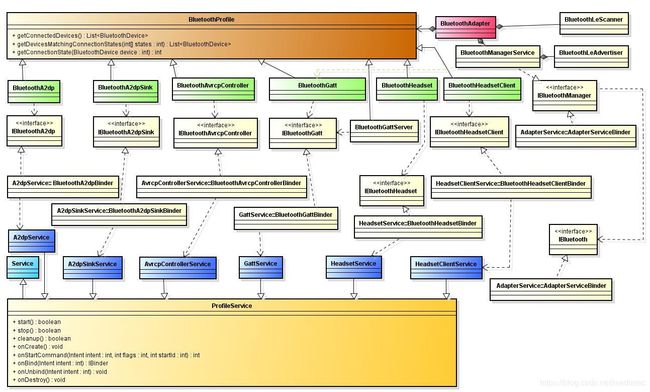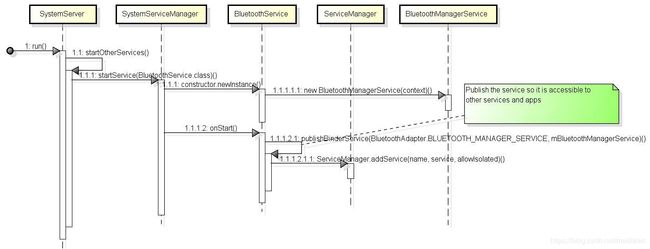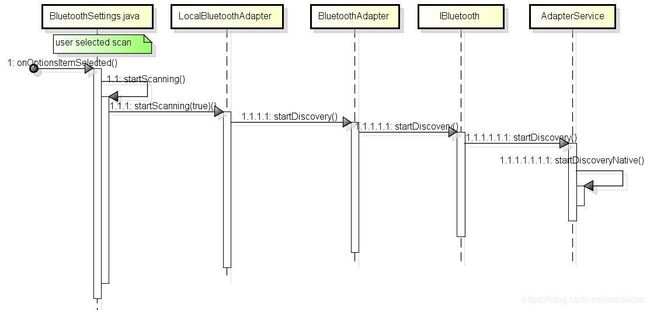Android Bluetooth源码分析总结 - framework部分
Android Bluetooth源码分析总结 - framework部分
本篇主要包括如下内容:
1. 源码目录
2. 类图
3. use case举例
- 蓝牙服务初始化
- 打开蓝牙流程
- 搜索蓝牙流程
4. 应用层开发总结
1,BT framework代码主要位于如下目录:
android/frameworks/base/core/java/android/bluetooth
android/frameworks/base/services/core/java/com/android/server/BluetoothManagerService.java
android/packages/apps/Bluetooth2,class diagram如下图所示:
主要类设计意图说明如下(摘录源码):
- BluetoothAdapter
/**
* Represents the local device Bluetooth adapter. The BluetoothAdapter
* lets you perform fundamental Bluetooth tasks, such as initiate
* device discovery, query a list of bonded (paired) devices,
* instantiate a BluetoothDevice using a known MAC address, and create
* a BluetoothServerSocket to listen for connection requests from other
* devices, and start a scan for Bluetooth LE devices.
*
* To get a BluetoothAdapter representing the local Bluetooth
* adapter, when running on JELLY_BEAN_MR1 and below, call the
* static getDefaultAdapter method; when running on JELLY_BEAN_MR2 and
* higher, retrieve it through
* android.content.Context#getSystemService with
* android.content.Context#BLUETOOTH_SERVICE.
* Fundamentally, this is your starting point for all
* Bluetooth actions. Once you have the local adapter, you can get a set of
* BluetoothDevice objects representing all paired devices with
* getBondedDevices(); start device discovery with
* startDiscovery(); or create a BluetoothServerSocket to
* listen for incoming connection requests with
* listenUsingRfcommWithServiceRecord(String,UUID); or start a scan for
* Bluetooth LE devices with startLeScan(LeScanCallback callback).
*
* Note:
* Most methods require the android.Manifest.permission#BLUETOOTH
* permission and some also require the
* android.Manifest.permission#BLUETOOTH_ADMIN permission.
*
*/
public final class BluetoothAdapter {
......
}- BluetoothManagerService
class BluetoothManagerService extends IBluetoothManager.Stub {
......
}/**
* System private API for talking with the Bluetooth service.
*
* {@hide}
*/
interface IBluetoothManager
{
IBluetooth registerAdapter(in IBluetoothManagerCallback callback);
void unregisterAdapter(in IBluetoothManagerCallback callback);
void registerStateChangeCallback(in IBluetoothStateChangeCallback callback);
void unregisterStateChangeCallback(in IBluetoothStateChangeCallback callback);
boolean isEnabled();
boolean enable();
boolean enableNoAutoConnect();
boolean disable(boolean persist);
IBluetoothGatt getBluetoothGatt();
boolean bindBluetoothProfileService(int profile, IBluetoothProfileServiceConnection proxy);
void unbindBluetoothProfileService(int profile, IBluetoothProfileServiceConnection proxy);
String getAddress();
String getName();
boolean isBleScanAlwaysAvailable();
int updateBleAppCount(IBinder b, boolean enable);
boolean isBleAppPresent();
}- IBluetooth
/**
* System private API for talking with the Bluetooth service.
*
* {@hide}
*/
interface IBluetooth
{
boolean isEnabled();
int getState();
boolean enable();
boolean enableNoAutoConnect();
boolean disable();
String getAddress();
ParcelUuid[] getUuids();
boolean setName(in String name);
String getName();
int getScanMode();
boolean setScanMode(int mode, int duration);
int getDiscoverableTimeout();
boolean setDiscoverableTimeout(int timeout);
boolean startDiscovery();
boolean cancelDiscovery();
boolean isDiscovering();
int getAdapterConnectionState();
int getProfileConnectionState(int profile);
BluetoothDevice[] getBondedDevices();
boolean createBond(in BluetoothDevice device, in int transport);
boolean cancelBondProcess(in BluetoothDevice device);
boolean removeBond(in BluetoothDevice device);
int getBondState(in BluetoothDevice device);
int getConnectionState(in BluetoothDevice device);
String getRemoteName(in BluetoothDevice device);
int getRemoteType(in BluetoothDevice device);
String getRemoteAlias(in BluetoothDevice device);
boolean setRemoteAlias(in BluetoothDevice device, in String name);
int getRemoteClass(in BluetoothDevice device);
ParcelUuid[] getRemoteUuids(in BluetoothDevice device);
boolean fetchRemoteUuids(in BluetoothDevice device);
boolean sdpSearch(in BluetoothDevice device, in ParcelUuid uuid);
boolean setPin(in BluetoothDevice device, boolean accept, int len, in byte[] pinCode);
boolean setPasskey(in BluetoothDevice device, boolean accept, int len, in byte[]
passkey);
boolean setPairingConfirmation(in BluetoothDevice device, boolean accept);
int getPhonebookAccessPermission(in BluetoothDevice device);
boolean setPhonebookAccessPermission(in BluetoothDevice device, int value);
int getMessageAccessPermission(in BluetoothDevice device);
boolean setMessageAccessPermission(in BluetoothDevice device, int value);
int getSimAccessPermission(in BluetoothDevice device);
boolean setSimAccessPermission(in BluetoothDevice device, int value);
void sendConnectionStateChange(in BluetoothDevice device, int profile, int state, int prevState);
void registerCallback(in IBluetoothCallback callback);
void unregisterCallback(in IBluetoothCallback callback);
// For Socket
ParcelFileDescriptor connectSocket(in BluetoothDevice device, int type, in ParcelUuid uuid, int port, int flag);
ParcelFileDescriptor createSocketChannel(int type, in String serviceName, in ParcelUuid uuid, int port, int flag);
boolean configHciSnoopLog(boolean enable);
boolean factoryReset();
boolean isMultiAdvertisementSupported();
boolean isPeripheralModeSupported();
boolean isOffloadedFilteringSupported();
boolean isOffloadedScanBatchingSupported();
boolean isActivityAndEnergyReportingSupported();
void getActivityEnergyInfoFromController();
BluetoothActivityEnergyInfo reportActivityInfo();
// For dumpsys support
void dump(in ParcelFileDescriptor fd);
void onLeServiceUp();
void onBrEdrDown();
}另外,IBluetooth的server端实现为AdapterService的内部类(位于android/packages/apps/Bluetooth/src/com/android/bluetooth/btservice/AdapterService.java),摘录如下:
/**
* Handlers for incoming service calls
*/
private AdapterServiceBinder mBinder;
/**
* The Binder implementation must be declared to be a static class, with
* the AdapterService instance passed in the constructor. Furthermore,
* when the AdapterService shuts down, the reference to the AdapterService
* must be explicitly removed.
*
* Otherwise, a memory leak can occur from repeated starting/stopping the
* service...Please refer to android.os.Binder for further details on
* why an inner instance class should be avoided.
*
*/
private static class AdapterServiceBinder extends IBluetooth.Stub {
......
}
- BluetoothLeScanner
/**
* This class provides methods to perform scan related operations for Bluetooth LE devices. An
* application can scan for a particular type of Bluetooth LE devices using {@link ScanFilter}. It
* can also request different types of callbacks for delivering the result.
*
* Use {@link BluetoothAdapter#getBluetoothLeScanner()} to get an instance of
* {@link BluetoothLeScanner}.
*
* Note: Most of the scan methods here require
* {@link android.Manifest.permission#BLUETOOTH_ADMIN} permission.
*
* @see ScanFilter
*/
public final class BluetoothLeScanner {
......
}
- BluetoothLeAdvertiser
/**
* This class provides a way to perform Bluetooth LE advertise operations, such as starting and
* stopping advertising. An advertiser can broadcast up to 31 bytes of advertisement data
* represented by {@link AdvertiseData}.
*
* To get an instance of {@link BluetoothLeAdvertiser}, call the
* {@link BluetoothAdapter#getBluetoothLeAdvertiser()} method.
*
* Note: Most of the methods here require {@link android.Manifest.permission#BLUETOOTH_ADMIN}
* permission.
*
* @see AdvertiseData
*/
public final class BluetoothLeAdvertiser {
......
}
- BluetoothProfile
/**
* Public APIs for the Bluetooth Profiles.
*
* Clients should call {@link BluetoothAdapter#getProfileProxy},
* to get the Profile Proxy. Each public profile implements this
* interface.
*/
public interface BluetoothProfile {
......
}
可以发现有一系列的应用层profile类存在,比如BluetoothA2dp,BluetoothA2dpSink、BluetoothGatt,BluetoothHeadset,BluetoothSap,BluetoothPan等等,上述图中没有罗列完全,而且这些类都继承自BluetoothProfile. (若是有新的profile添加,可以参考已存在profile进行相关实现。)另外,每个具体的profile类(比如BluetoothA2dp)都依赖于对应的service实现(对应于BluetoothA2dpService),而这些XXXProfileService就会依赖JNI,最终调用到HAL层。
3,序列图
3.1 蓝牙服务初始化
3.2 蓝牙打开流程
- BluetoothEnabler->LocalBluetoothAdapter->BluetoothAdapter->BluetoothManagerService->IBluetooth.stub->AdapterService
各代码路径:
android/packages/apps/Settings/src/com/android/settings/bluetooth/BluetoothEnabler.java
android/frameworks/base/packages/SettingsLib/src/com/android/settingslib/bluetooth/LocalBluetoothAdapter.java
android/frameworks/base/core/java/android/bluetooth/BluetoothAdapter.java
android/frameworks/base/services/core/java/com/android/server/BluetoothManagerService.java
android/frameworks/base/core/java/android/bluetooth/IBluetooth.aidl
android/packages/apps/Bluetooth/src/com/android/bluetooth/btservice/AdapterService.java- AdapterService->AdapterState->AdapterService->JNI->bluetooth.h
各代码路径及类说明:
android/packages/apps/Bluetooth/src/com/android/bluetooth/btservice/AdapterService.java
android/packages/apps/Bluetooth/src/com/android/bluetooth/btservice/AdapterState.java
android/hardware/libhardware/include/hardware/bluetooth.h/**
* This state machine handles Bluetooth Adapter State.
* States:
* {@link OnState} : Bluetooth is on at this state
* {@link OffState}: Bluetooth is off at this state. This is the initial
* state.
* {@link PendingCommandState} : An enable / disable operation is pending.
* TODO(BT): Add per process on state.
*/
final class AdapterState extends StateMachine {
......
}/**
* The Bluetooth Hardware Module ID
*/
#define BT_HARDWARE_MODULE_ID "bluetooth"
#define BT_STACK_MODULE_ID "bluetooth"
#define BT_STACK_TEST_MODULE_ID "bluetooth_test"
/* Bluetooth profile interface IDs */
#define BT_PROFILE_HANDSFREE_ID "handsfree"
#define BT_PROFILE_HANDSFREE_CLIENT_ID "handsfree_client"
#define BT_PROFILE_ADVANCED_AUDIO_ID "a2dp"
#define BT_PROFILE_ADVANCED_AUDIO_SINK_ID "a2dp_sink"
#define BT_PROFILE_HEALTH_ID "health"
#define BT_PROFILE_SOCKETS_ID "socket"
#define BT_PROFILE_HIDHOST_ID "hidhost"
#define BT_PROFILE_PAN_ID "pan"
#define BT_PROFILE_MAP_CLIENT_ID "map_client"
#define BT_PROFILE_SDP_CLIENT_ID "sdp"
#define BT_PROFILE_GATT_ID "gatt"
#define BT_PROFILE_AV_RC_ID "avrcp"
#define BT_PROFILE_AV_RC_CTRL_ID "avrcp_ctrl"
......
......
/** NOTE: By default, no profiles are initialized at the time of init/enable.
* Whenever the application invokes the 'init' API of a profile, then one of
* the following shall occur:
*
* 1.) If Bluetooth is not enabled, then the Bluetooth core shall mark the
* profile as enabled. Subsequently, when the application invokes the
* Bluetooth 'enable', as part of the enable sequence the profile that were
* marked shall be enabled by calling appropriate stack APIs. The
* 'adapter_properties_cb' shall return the list of UUIDs of the
* enabled profiles.
*
* 2.) If Bluetooth is enabled, then the Bluetooth core shall invoke the stack
* profile API to initialize the profile and trigger a
* 'adapter_properties_cb' with the current list of UUIDs including the
* newly added profile's UUID.
*
* The reverse shall occur whenever the profile 'cleanup' APIs are invoked
*/
/** Represents the standard Bluetooth DM interface. */
typedef struct {
/** set to sizeof(bt_interface_t) */
size_t size;
/**
* Opens the interface and provides the callback routines
* to the implemenation of this interface.
*/
int (*init)(bt_callbacks_t* callbacks );
/** Enable Bluetooth. */
int (*enable)(void);
/** Disable Bluetooth. */
int (*disable)(void);
/** Closes the interface. */
void (*cleanup)(void);
/** Get all Bluetooth Adapter properties at init */
int (*get_adapter_properties)(void);
/** Get Bluetooth Adapter property of 'type' */
int (*get_adapter_property)(bt_property_type_t type);
/** Set Bluetooth Adapter property of 'type' */
/* Based on the type, val shall be one of
* bt_bdaddr_t or bt_bdname_t or bt_scanmode_t etc
*/
int (*set_adapter_property)(const bt_property_t *property);
/** Get all Remote Device properties */
int (*get_remote_device_properties)(bt_bdaddr_t *remote_addr);
/** Get Remote Device property of 'type' */
int (*get_remote_device_property)(bt_bdaddr_t *remote_addr,
bt_property_type_t type);
/** Set Remote Device property of 'type' */
int (*set_remote_device_property)(bt_bdaddr_t *remote_addr,
const bt_property_t *property);
/** Get Remote Device's service record for the given UUID */
int (*get_remote_service_record)(bt_bdaddr_t *remote_addr,
bt_uuid_t *uuid);
/** Start SDP to get remote services */
int (*get_remote_services)(bt_bdaddr_t *remote_addr);
/** Start Discovery */
int (*start_discovery)(void);
/** Cancel Discovery */
int (*cancel_discovery)(void);
/** Create Bluetooth Bonding */
int (*create_bond)(const bt_bdaddr_t *bd_addr, int transport);
/** Remove Bond */
int (*remove_bond)(const bt_bdaddr_t *bd_addr);
/** Cancel Bond */
int (*cancel_bond)(const bt_bdaddr_t *bd_addr);
/**
* Get the connection status for a given remote device.
* return value of 0 means the device is not connected,
* non-zero return status indicates an active connection.
*/
int (*get_connection_state)(const bt_bdaddr_t *bd_addr);
/** BT Legacy PinKey Reply */
/** If accept==FALSE, then pin_len and pin_code shall be 0x0 */
int (*pin_reply)(const bt_bdaddr_t *bd_addr, uint8_t accept,
uint8_t pin_len, bt_pin_code_t *pin_code);
/** BT SSP Reply - Just Works, Numeric Comparison and Passkey
* passkey shall be zero for BT_SSP_VARIANT_PASSKEY_COMPARISON &
* BT_SSP_VARIANT_CONSENT
* For BT_SSP_VARIANT_PASSKEY_ENTRY, if accept==FALSE, then passkey
* shall be zero */
int (*ssp_reply)(const bt_bdaddr_t *bd_addr, bt_ssp_variant_t variant,
uint8_t accept, uint32_t passkey);
/** Get Bluetooth profile interface */
const void* (*get_profile_interface) (const char *profile_id);
/** Bluetooth Test Mode APIs - Bluetooth must be enabled for these APIs */
/* Configure DUT Mode - Use this mode to enter/exit DUT mode */
int (*dut_mode_configure)(uint8_t enable);
/* Send any test HCI (vendor-specific) command to the controller. Must be in DUT Mode */
int (*dut_mode_send)(uint16_t opcode, uint8_t *buf, uint8_t len);
/** BLE Test Mode APIs */
/* opcode MUST be one of: LE_Receiver_Test, LE_Transmitter_Test, LE_Test_End */
int (*le_test_mode)(uint16_t opcode, uint8_t *buf, uint8_t len);
/* enable or disable bluetooth HCI snoop log */
int (*config_hci_snoop_log)(uint8_t enable);
/** Sets the OS call-out functions that bluedroid needs for alarms and wake locks.
* This should be called immediately after a successful |init|.
*/
int (*set_os_callouts)(bt_os_callouts_t *callouts);
/** Read Energy info details - return value indicates BT_STATUS_SUCCESS or BT_STATUS_NOT_READY
* Success indicates that the VSC command was sent to controller
*/
int (*read_energy_info)();
/**
* Native support for dumpsys function
* Function is synchronous and |fd| is owned by caller.
*/
void (*dump)(int fd);
/**
* Clear /data/misc/bt_config.conf and erase all stored connections
*/
int (*config_clear)(void);
/**
* Clear (reset) the dynamic portion of the device interoperability database.
*/
void (*interop_database_clear)(void);
/**
* Add a new device interoperability workaround for a remote device whose
* first |len| bytes of the its device address match |addr|.
* NOTE: |feature| has to match an item defined in interop_feature_t (interop.h).
*/
void (*interop_database_add)(uint16_t feature, const bt_bdaddr_t *addr, size_t len);
} bt_interface_t;
/** TODO: Need to add APIs for Service Discovery, Service authorization and
* connection management. Also need to add APIs for configuring
* properties of remote bonded devices such as name, UUID etc. */
typedef struct {
struct hw_device_t common;
const bt_interface_t* (*get_bluetooth_interface)();
} bluetooth_device_t;
typedef bluetooth_device_t bluetooth_module_t;3.3 蓝牙搜索流程
- BluetoothSetting->LocalBluetoothAdapter->BluetoothAdapter->IBluetooth.stub->AdapterService
- AdapterService->JNI->bluetooth.h
4. 应用层开发
蓝牙app开发,官方文档说明的已经很详细,链接如下:
- 传统蓝牙部分
- BLE部分





